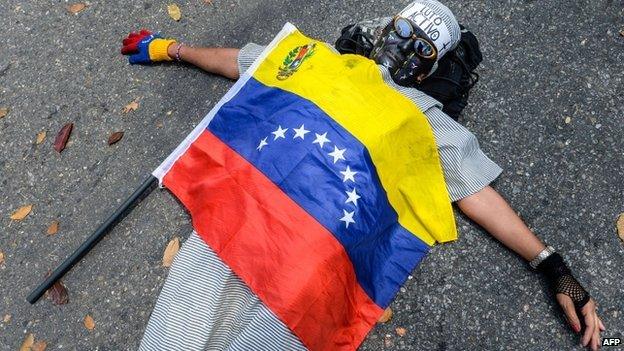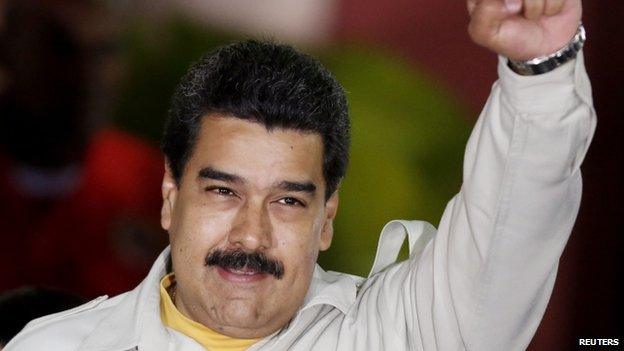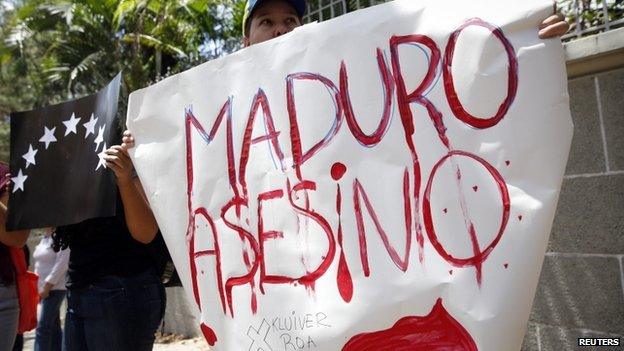Is Venezuela losing faith in Hugo Chavez's successor?
- Published

The death of a student sparked protests
It was clear from the very start that many Chavez supporters weren't so sure about Nicolas Maduro.
Shortly after his untimely death from cancer on 5 March 2013 - and just days before the presidential election that saw Mr Maduro elected by the narrowest of margins - I visited the charismatic socialist leader's stronghold of 23 de Enero in Caracas.
Inside her government-built apartment, local Socialist Party (PSUV) women's cooperative leader Judith Vegas fought back the tears at the mere mention of Hugo Chavez.
His death was as raw to her as the loss of a member of her own family.
But when it came to his chosen successor, her attitude noticeably hardened.
She would vote for Mr Maduro as Mr Chavez had asked, she said, but he wasn't guaranteed her unflinching support simply because he had been by Chavez's side.
Fast-forward two years, and even committed "Chavistas" like Judith are losing the faith.
In a recent poll, President Maduro's popularity rate had dropped to just 22%.

Nicolas Maduro:

President Maduro was Hugo Chavez's preferred successor
A former bus driver in Caracas, he became a trade union leader before being elected to the National Assembly in 2000
Became Hugo Chavez's foreign minister in 2006 and vice-president in 2012
President Chavez chose him as his preferred successor
In presidential polls in April 2013, triggered by Chavez's death, Mr Maduro won by a razor-thin margin
But in local elections eight months later, the government coalition won 54% of the vote, a comfortable 10-point lead over the opposition
Mass anti-government protests rocked cities such as San Cristobal and Caracas in the first half of 2014 but were largely confined to areas where opposition supporters lived

"I have to be honest, I haven't felt the same since Chavez died and I haven't seen any results from Maduro," Ms Vegas tells me from Caracas.
Furthermore, she thinks he is losing his grip in places like 23 de Enero.
"He's letting it get out of his hands, he's losing control," the cooperative leader says, referring to a combustible combination of a worsening security situation and widespread economic chaos.
The latest high-profile victim of that violence is Kluiver Roa Nunez.
The 14-year-old was killed after being shot in the head with a rubber bullet by a police officer in Tachira state as he took part in a protest over food shortages and long queues at supermarkets.
The policeman in question had been arrested and an investigation launched, the government said.
The levels of inflation, external in Venezuela remain among the highest in the world, meanwhile the government is trying to rein in the country's labyrinthine multiple exchange-rate system.
The dollar recently hit 220 bolivars on the black market, a vast distance from the 6.3 bolivars or even the 177 bolivars (depending on the rate available) that the government says it is worth.
Perhaps trying to emulate an oft-used Chavez tactic when facing tough times, Mr Maduro has gone on the offensive.
He has accused the US of waging an economic war on the nation and of fostering plans for a coup against him.
He has also arrested the opposition Mayor of Caracas, Antonio Ledezma, external, for his alleged role in widespread violent protests last year in which 43 people died.

Tachira state is a hotbed of unrest
Mr Maduro said Mr Ledezma would have to answer for "all the crimes committed against the country's peace, security and constitution".
Given that another opposition figure, Leopoldo Lopez, has been in jail for over a year now with still no verdict in his case, Mr Ledezma may find that he faces the prospect of many months behind bars.
The situation has even provoked Pope Francis, a Latin American of course, to call for peace and dialogue.
Pressure is growing on regional groups, such as the Union of South American Nations (Unasur), to speak out about Venezuela.
In many ways, though, the seeds of the current crisis were sown long before Mr Maduro took over the reins of power.
The oil price - the motor of the Venezuelan economy - has plummeted since he came to power, and it's increasingly clear that the structures in place to cope with these less plentiful times are inadequate and corrupt.
As it was two years ago, this is an election year in Venezuela, with parliamentary elections due in a few months.
"I have heard many, many Chavistas say 'Chavez si, Maduro no,'" says Ms Vegas.
Does she share that view?
"A little, yes," she admits sheepishly, though she is quick to reiterate that - for her at least - that doesn't equate to voting for the opposition.
But it's the first time I've ever heard her deviate from the PSUV line.
One wonders how many less-committed Chavistas have already abandoned President Maduro altogether.